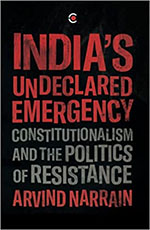The phrase ‘undeclared emergency’ is not new to Indian political discourse. The features of the Emergency period (1975-77), imposed by the Indira Gandhi-led Congress government, have since then provided political actors and analysts alike with a framework of comparison to evaluate the state of Indian democracy. It has been used in the context of extraordinary laws, instruments like the Armed Forces (Special Powers) Act, paramilitary measures like Operation Greenhunt as well as the experience of false cases, arrests and clampdown on protests especially on rights over land and natural resources. In the past six years however, this phrase has become a shorthand description of the major shift in India’s democratic trajectory with the consolidation of the ‘BJP system’ under Narendra Modi, even as the government has ritualized remembering the excesses of the Emergency. If the mob lynching of Mohammed Akhlaq in 2015 came as a shock to the polity, what has followed is a breathless cascade of events—of mob violence, arbitrary arrests and prolonged detentions on one hand, and major legal and policy changes on the other. These have raised grave anxieties about the future of our constitutional liberal democracy with downward trends reported by all studies monitoring the performance of democracies. It thus becomes necessary to go beyond the catchphrase and look at the present in terms of the long arc of post-Independence history to make sense of the parallels with and departures from that of the past. This book attempts this tough task and the result is a valuable resource.
To do so, Narrain wades through a huge mass of material—Constituent Assembly Debates, parliamentary and judicial proceedings, legislations and court judgments, enquiry commissions and fact-finding reports, news reportage, academic scholarship and op-ed commentaries. The references comprise a whopping 58 pages! Yet the writing is remarkably jargon-free, clear and accessible despite dealing with domains (in)famous for their obstruse vocabularies. It fills a critical gap on this theme especially in the in-demand genre of ‘narrative non-fiction’ while being equally useful to specialized disciplines and activist groups.
The book uses two conceptual pairs to make sense of the present in terms of historical experience, both Indian and global; authoritarianism/totalitarianism and normative/prerogative state. Using Juan Linz’s framework on the first pair and drawing extensively on Hannah Arendt’s work on totalitarianism, Narrain makes two key arguments.

